If you or someone you know has an autoimmune disease, you know how much of a struggle it can be. Dealing with it may feel like a never-ending battle, leaving you tired, frustrated, and unsure of what’s coming next.
What makes autoimmune diseases so tricky is that they manifest when the body’s immune system — the part that’s supposed to protect you — starts attacking healthy cells by mistake. This can present through a wide variety of symptoms, so diagnosis and treatment aren’t always straightforward and can take a while.
Unfortunately, autoimmunity is more common than ever. Worldwide, 5% to 10% of the population may suffer from one or more autoimmune conditions. And in the US, autoimmune diseases are the third most common illness category, after cancer and heart disease. Women are disproportionately affected, with a staggering 78% of cases involving them.
But here’s the good news: there’s growing evidence that what you eat can make a real difference in preventing, managing, and possibly even reversing autoimmune diseases. The right foods can help calm inflammation, ease symptoms, and even support your body’s healing process. So, what kinds of foods and diets are best for autoimmune diseases?
Before we answer that, let’s look at what autoimmune diseases are and what they have in common.
What Is an Autoimmune Disease?

There are over 80 different autoimmune diseases, so there is no singular definition of an autoimmune condition. However, they all share the commonality that the immune system starts misidentifying healthy tissue, cells, and other bodily components as potentially dangerous foreign invaders. In autoimmune disease, the body mistakenly attacks itself to seemingly protect itself from harm. This internal battle can lead to a cascade of symptoms that may vary from person to person.
The autoimmune process can attack different organs and systems, from the pancreas to the thyroid to the skin. The progression and intensity can also vary: for some, symptoms may be minor and come on gradually over months or even years. Others may have an acute “attack” with severe and debilitating symptoms that gradually go away or even progress.
Of the many possible symptoms of various autoimmune disorders, some of the most common are:
- Fatigue
- Loss of appetite
- Low-grade or recurrent fevers
- Muscle aches
- Joint pain or swelling
- Skin problems (rash, blisters, etc.)
- Gastrointestinal issues
- Shortness of breath
Almost any part of the body can be affected by autoimmunity. Types of autoimmune disorders include:
- Thyroid disorders: Grave’s disease or Hashimoto’s disease
- Neurological disorders: Multiple sclerosis or Guillain-Barré syndrome
- Systemic disorders that may attack multiple areas of the body: Lupus, scleroderma, or rheumatoid arthritis
- Gastrointestinal disorders: Inflammatory bowel disease or celiac disease
- Organ-specific disorders: Type 1 diabetes (pancreas) or autoimmune hepatitis (liver)
Your immune system is essential for good health, protecting against harmful pathogens. But when its delicate balance is disrupted, it can become a source of harm, wreaking havoc on your health. So why does this happen?
What Causes Autoimmune Diseases?
While there’s no definitive answer as to what causes autoimmune diseases, many scientists suspect the following three things play a role:
- Genetics
- Infections
- Environmental factors include food allergies and sensitivities, exposure to toxins in our air, food, and water, the balance of intestinal bacteria, and the food we eat.
In recent history, Westernized countries have seen significantly higher rates of these diseases, strongly indicating that autoimmune diseases are not just a product of genetics or bad luck. Instead, they may be strongly influenced by our choices and environment. Researchers believe that even if a predisposing gene is present, environmental factors or infections may be the trigger that “turns on” the gene and that these triggers cause inflammation within the body.
How Excessive Inflammation Is Linked to Autoimmune Diseases

Fundamentally, autoimmune diseases are an inflammation issue. According to the Journal of Immunology Research, “increasing evidence shows that the abnormal inflammatory response is closely associated with many chronic diseases, especially in autoimmune diseases…”
Inflammation isn’t inherently a bad thing. It’s a normal and very important part of the healing process; when you cut your finger and experience some redness, heat, and swelling, those symptoms are your immune system doing damage control and initiating the healing process.
By contrast, the disease can manifest when your immune system has an abnormal response to inflammation, or you’re dealing with chronic inflammation (as opposed to the acute inflammation caused by a one-time injury like a cut finger). In fact, inflammatory diseases, which also include type 2 diabetes, Alzheimer’s, cancer, and nonalcoholic fatty liver disease — in addition to autoimmune disorders — may be responsible for up to 50% of deaths worldwide.
Excessive inflammation may stem from several sources (just see the causes of autoimmune disease above), but many researchers believe what Hippocrates told us 2,400 years ago—that all disease starts in the gut. Therefore, gut health is crucial for healing and preventing the development of autoimmune conditions.
A 2017 study published in Frontiers of Immunology found that a “leaky gut” — when the intestinal epithelial lining loses integrity and allows the passage of bacteria and toxins into the blood — can “trigger the initiation and development of autoimmune disease.”
So, what’s the best way to take care of your gut? Food is one of the most powerful tools for promoting good gut bacteria while also fighting excessive inflammation and autoimmunity.
What Diets May Help With Autoimmune Disease?

1. Autoimmune Protocol (AIP) Diet
One of the most well-known diets for autoimmune disorders is the Autoimmune Protocol (AIP). This temporary, Paleo-style elimination diet is designed to reduce inflammation and alleviate symptoms in individuals with autoimmune diseases. In theory, it involves removing foods that may trigger immune responses and, by extension, inflammation and gradually reintroducing them to identify specific food sensitivities.
The AIP diet avoids common allergens, such as dairy, wheat, eggs, nuts, and nightshade vegetables. Processed foods and alcoholic beverages are also strictly avoided due to their inflammatory nature.
Because this is a type of Paleo diet, it typically includes meat, seafood, and bone broth. However, the primary focus is on fresh vegetables and fermented foods.
Research on the AIP diet’s effectiveness is emerging. A 2017 study involving individuals with inflammatory bowel disease (IBD) found that after following the AIP diet, 73% achieved clinical remission, indicating reduced inflammation and symptom relief.
Another study in 2019 focused on women with Hashimoto’s thyroiditis, an autoimmune thyroid disorder. Participants reported significant improvements in quality of life and reductions in inflammation markers after a 10-week AIP diet and lifestyle intervention.
While these studies are promising, more extensive research is needed to fully understand the AIP diet’s impact on various autoimmune conditions. It’s also important to highlight that because this is an elimination diet, it could be wise to gradually and carefully reintroduce otherwise healthy foods once symptoms have been reversed. We also don’t know if folks on the AIP would fare better with a more plant-based version of the protocol. There may be other dietary patterns that are even more effective in the long term.
2. Mediterranean Diet
The Mediterranean diet is a primarily plant-based eating pattern traditionally followed in countries bordering the Mediterranean Sea (such as Greece, Italy, and parts of Spain). It emphasizes consuming fruits, vegetables, whole grains, legumes, nuts, and healthy fats, particularly olive oil. While moderate intake of fish and poultry is sometimes encouraged, red meat and processed foods are limited.
Many health researchers and experts consider the Mediterranean diet to be one of the healthiest diet patterns. Two of the five blue zone communities (where people live the longest, healthiest lives) follow their own versions of a Mediterranean diet. (For trivia buffs, the Mediterranean blue zones are Ikaria, Greece, and Sardinia, Italy.)
This plant-forward diet is rich in antioxidants and anti-inflammatory compounds, which benefit individuals with or without autoimmune diseases. However, its benefits are compounded if you have an autoimmune condition.
A 2021 study on women with systemic lupus erythematosus found that higher adherence to the Mediterranean diet was associated with lower disease activity and less damage to organs and tissues.
Another systematic review indicated that a predominantly plant-based Mediterranean diet’s anti-inflammatory properties might benefit individuals with autoimmune thyroid diseases by modulating immune responses and reducing oxidative stress.
Additionally, research has shown that a higher quality Mediterranean diet (measured by the aMED or alternate Mediterranean score) is associated with a longer time between relapses in women with multiple sclerosis, suggesting a potential role in managing autoimmunity.
For more on this way of eating, check out our article How to Create Vegan Mediterranean Recipes for Well-Being and Longevity.
3. Whole Food, Plant-Based Diet
While every autoimmune disease is different, we’ve seen that they share a common mechanism. They also share something else in common: the power of plants to help alleviate symptoms and heal the body.
Whole food, plant-based diets emphasize minimally processed foods derived from plants, including fruits, vegetables, whole grains, legumes, nuts, and seeds. They exclude or minimize animal products such as meat, dairy, and eggs.
A 2024 case series published in Frontiers in Nutrition examined three women with lupus and Sjögren’s syndrome (a type of autoimmune disease that primarily attacks the body’s moisture glands, such as those that produce sweat and tears) who adopted a whole-foods, plant-based diet. Participants focused predominantly on raw foods, especially leafy greens, cruciferous vegetables, and omega-3-rich foods. All three women reported significant improvements, with nearly all symptoms resolving within four weeks. Notably, two patients remained symptom-free for over six years without an ongoing need for medication.
A 2019 review also examined the potential benefits of plant-based diets for individuals with rheumatoid arthritis (RA). The authors found that adopting a diet rich in fruits, vegetables, grains, and legumes, may reduce systemic inflammation and alleviate RA symptoms. The anti-inflammatory effects were attributed to the high levels of fiber, antioxidants, and phytochemicals in plant-based foods.
A 2020 systematic review and meta-analysis compared the differences between plant-based and omnivorous diets, looking at inflammatory biomarkers. The study found that individuals adhering to vegan and vegetarian diets had significantly lower levels of C-reactive protein, a key marker of inflammation, than those consuming omnivorous diets.
The American College of Lifestyle Medicine also published a white paper on the benefits of plant-based nutrition for autoimmune diseases. The paper, recommended as a resource for lifestyle medicine practitioners, highlights key points that show plant-based diets, especially those that are raw or gluten-free, decrease inflammation by changing the gut microbiome.
What’s more, a 2023 study found that a largely plant-based diet (which also included some yogurt and eggs) plus a drug, infliximab, used to treat autoimmune diseases was able to put 96% of the study participants in remission from Crohn’s. Even more significantly, over half of them remained symptom-free 10 years later. The researchers commented that the diet seemed to help patients tolerate and benefit from the infliximab, so the two treatments acted synergistically.
Good Foods for Autoimmune Diseases
As we’ve seen, certain foods are better than others at supporting an appropriate immune response. Some of the best foods for fighting excess inflammation are plant-based.
A few of the top foods to incorporate into an autoimmune disease-fighting diet include:
Cruciferous Vegetables

Vegetables like arugula, kale, and Swiss chard are rich in vitamins A, C, and K, as well as folate and fiber. Their high antioxidant content helps reduce inflammation, which benefits autoimmune conditions.
As noted above, a 2024 study in Frontiers in Nutrition suggests that plant-based diets, abundant in leafy greens and cruciferous veggies, may alleviate symptoms of rheumatoid arthritis by decreasing systemic inflammation. One nutrient responsible for their anti-inflammatory superpowers is sulforaphane, a potent antioxidant. Sulforaphane interferes with inflammasome activation (part of the innate immune system), effectively reducing the inflammatory response.
Fermented Foods

Foods like sauerkraut, kimchi, and yogurt are rich in probiotics, which can promote a healthy gut microbiome. A balanced gut is crucial for immune regulation and may reduce autoimmune flare-ups.
One systematic review of various fermented foods argued that they should be considered functional foods, as they are all excellent sources of natural anti-inflammatory compounds.
Mushrooms
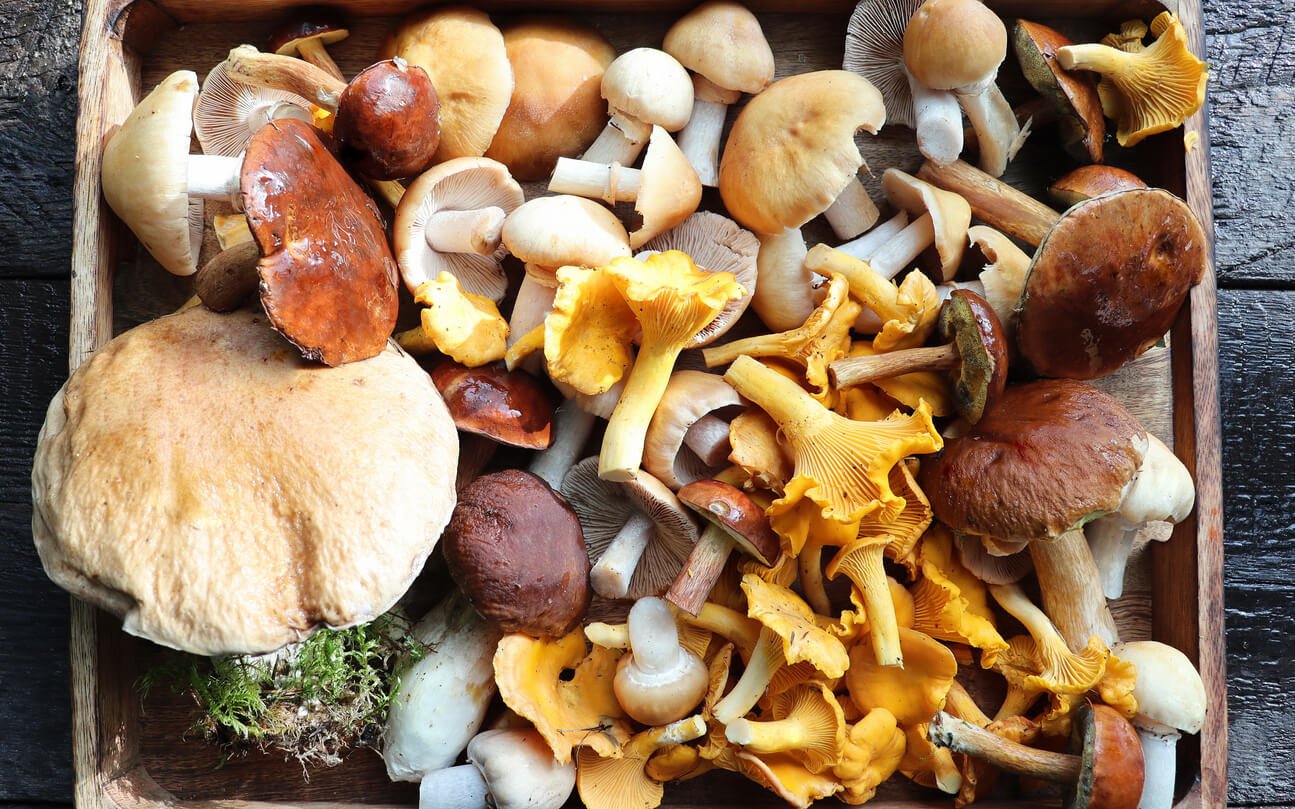
Fungi have also demonstrated tremendous anti-inflammatory potential.
One study published in Mediators of Inflammation found that mushrooms can promote anticancer activity, suppress autoimmune diseases, and aid in allergy relief.
Onions
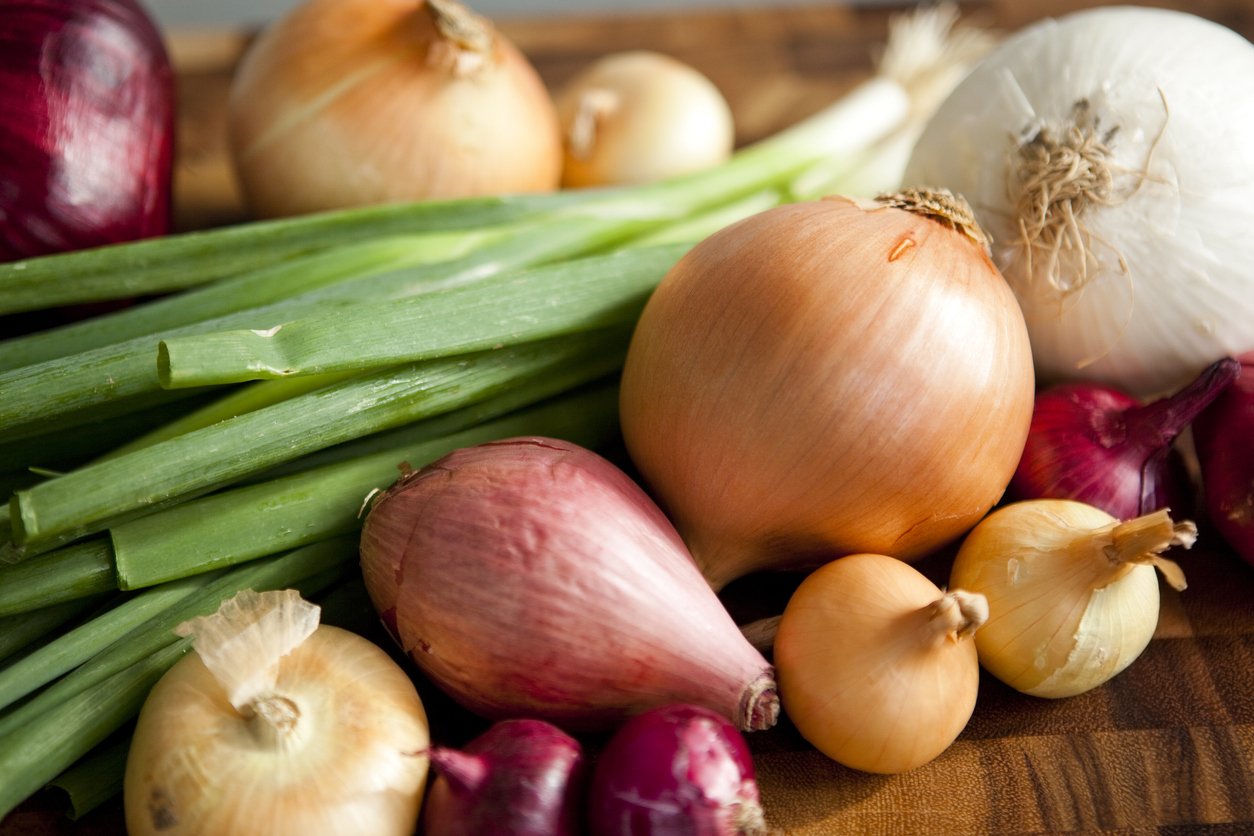
These flavorful veggies have long been touted for their beneficial anti-inflammatory effects. Onions and other alliums contain quercetin, an antioxidant that has been shown to inhibit inflammation-causing leukotrienes, prostaglandins, and histamines in osteoarthritis and rheumatoid arthritis.
Blueberries

Berries have a number of powerful antioxidants and phenolic compounds that help fight inflammation.
A 2020 study published in The Federation of American Societies for Experimental Biology Journal investigated the effects of pterostilbene (PSB), a compound found in blueberries, on colonic inflammation due to inflammatory bowel disease. The researchers found that PSB reduced colonic inflammation by suppressing the activation of dendritic cells, which are immune cells that play a key role in initiating inflammatory responses. Additionally, PSB promotes the development of regulatory T cells, which help maintain immune tolerance and prevent autoimmune reactions.
Spices

Certain spices are particularly beneficial for minimizing inflammation and boosting your body’s healthy immune response. Turmeric, in particular, is a powerful anti-inflammatory.
A study published in Advances in Experimental Medicine and Biology noted that curcumin (the primary active ingredient in turmeric) has been shown to help with multiple sclerosis, rheumatoid arthritis, psoriasis, and inflammatory bowel disease.
Ginger may also help reduce inflammation and disease activity in individuals with autoimmune disorders by inhibiting the formation of neutrophil extracellular traps. These webs of white blood cells are associated with increased inflammation and clotting in autoimmune conditions.
Worst Foods for Autoimmune Disease
Now that we know what foods to include in an anti-autoimmune diet, what about foods to avoid? People battling autoimmune disorders may want to consider reducing their intake of the following foods/ingredients:
Gluten

The main protein in wheat, spelt, rye, and barley, as well as a key ingredient in many starchy comfort foods, gluten can be particularly challenging for those with autoimmune diseases.
For anyone with celiac disease, where the ingestion of gluten initiates an immune response in the small intestine, avoiding gluten is essential. However, many people struggling with other types of autoimmune diseases may also be gluten-sensitive.
For some people, gluten may contribute to leaky gut-related challenges. According to research published in Best Practice & Research: Clinical Gastroenterology, it may exacerbate conditions like multiple sclerosis, asthma, and RA by increasing inflammation in the gut.
For more on gluten, check out our article, Gluten-Free: Is it for Everyone?
Refined Sugar

The standard American diet tends to be high in sugar, and those with autoimmune conditions are particularly susceptible to the adverse effects of this sweet substance.
A 2015 study published in Frontiers of Immunology found that sugar intake increased the likelihood of developing type 1 diabetes in children who were at genetic risk.
A 2022 study published in Cell Metabolism investigated the impact of dietary sugar on autoimmune diseases. The researchers found that high sugar intake exacerbated autoimmune responses by promoting the differentiation of pro-inflammatory T helper 17 (Th17) cells.
Refined sugar is found in processed foods, sugar-sweetened beverages, and baked goods. To avoid unnecessary inflammation and disease risk, it’s best to limit or eliminate these foods.
Animal Products
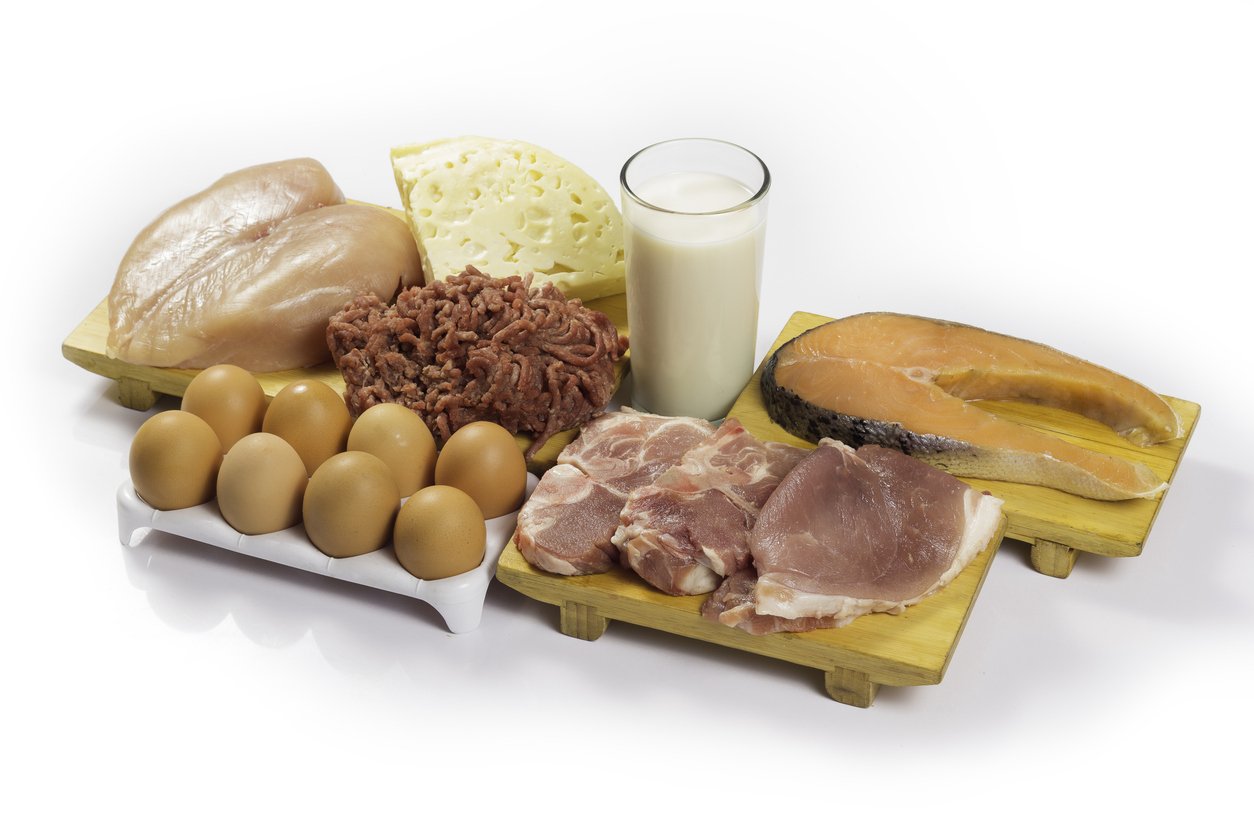
Many animal-based proteins, such as those found in meat, milk, and eggs, can trigger an inflammatory response in the body, exacerbating autoimmune conditions. Meat also contains harmful compounds such as IGF-1 and AGEs and can form TMAO, a toxic compound produced in your gut linked to multiple inflammatory conditions.
A 2022 case-control study published in Nutrition Journal examined the association between animal flesh foods and rheumatoid arthritis (RA). The study found that the more processed meats people ate, the higher their odds of having RA.
Research has also identified a potential link between cow’s milk and the development of autoimmune diseases. A review article discussed the association between type 1 diabetes and multiple sclerosis, suggesting that certain proteins in cow’s milk may trigger autoimmune responses in genetically susceptible individuals.
With so many whole-food plant proteins available, such as beans, lentils, tofu, and tempeh, there are many nutritional and culinary alternatives to animal products.
Autoimmune Diet Recipes
Are you ready to fuel your body with some serious plant-based power? These three recipes are loaded with the ultimate healing foods for autoimmune conditions, turning everyday meals into wellness-packed delights. Think vibrant veggies, soothing herbs, and gut-loving goodness — all wrapped up in dishes that taste as amazing as they’ll make you feel. Whether you’re craving something fresh, cozy, or downright satisfying, these recipes prove that healthy eating can be fun and delicious!f
1. The Unsweet Smoothie
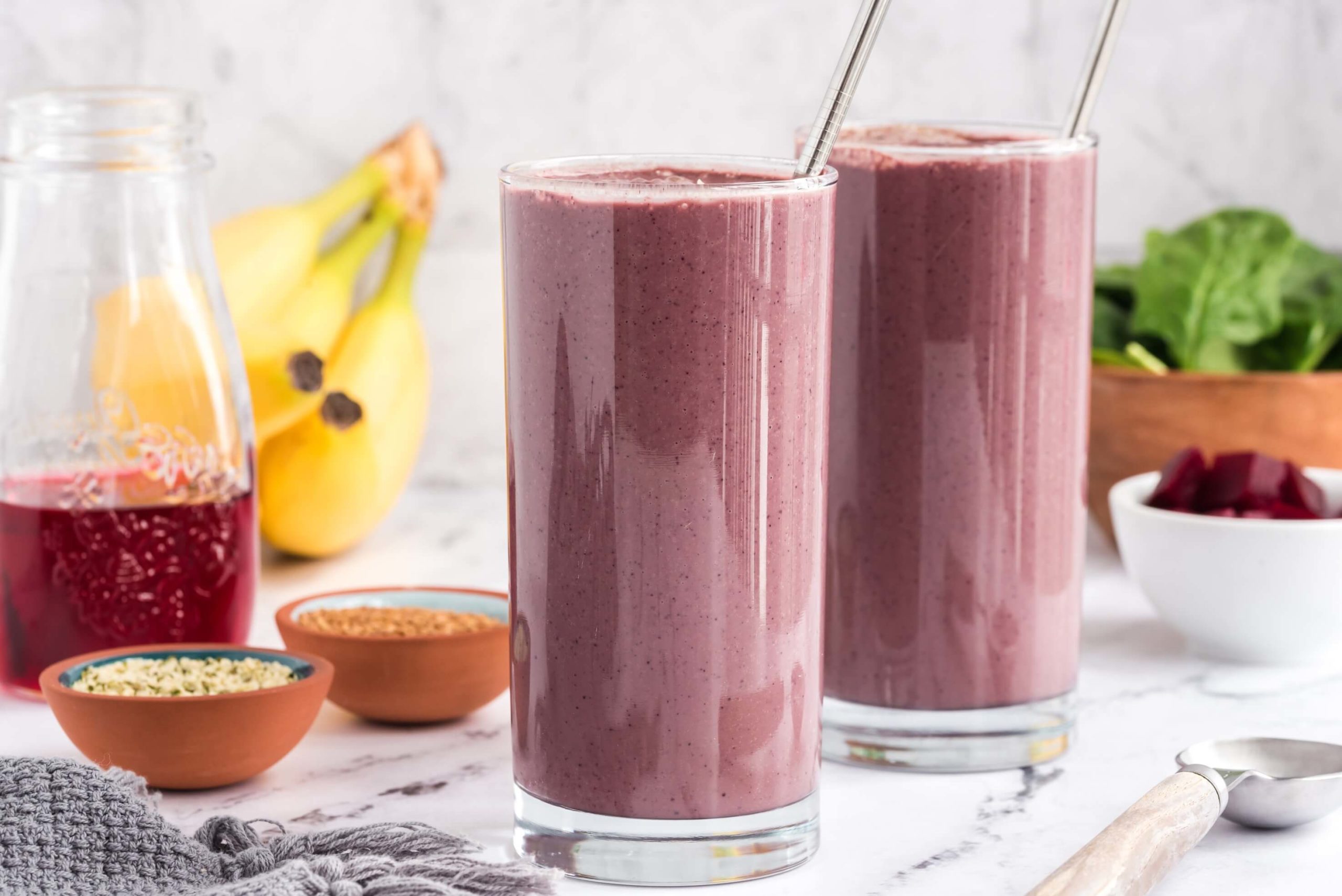
The Unsweet Smoothie is a nutrient-packed option that can especially benefit those with autoimmune conditions. Its anti-inflammatory ingredients, such as pickled beets, kale, and blueberries, help calm inflammation and promote overall health. Flax and hemp seeds provide omega-3s, while plant-based yogurt aids gut health, a vital factor in managing autoimmune symptoms. Naturally low in sugar and rich in fiber, this smoothie is both satisfying and gentle on digestion. It’s a refreshing way to nourish your body and support your well-being!
2. The Ultimate Immune-Supporting Soup

The Ultimate Immune-Supporting Soup is a flavorful, nutrient-packed bowl of comfort perfect for supporting wellness, especially for those with autoimmune conditions. Packed with anti-inflammatory ingredients like turmeric, garlic, and ginger, along with nutrient-rich kale and protein-packed chickpeas, it’s both soothing and satisfying. Creamy coconut milk and bold spices like smoked paprika and cumin create a rich, aromatic base, while a touch of cayenne adds optional warmth. This soup is as healing as it is delicious, offering a simple, wholesome way to nourish your body and soul.
3. Wild Rice, Mushroom, and Baby Broccoli Salad
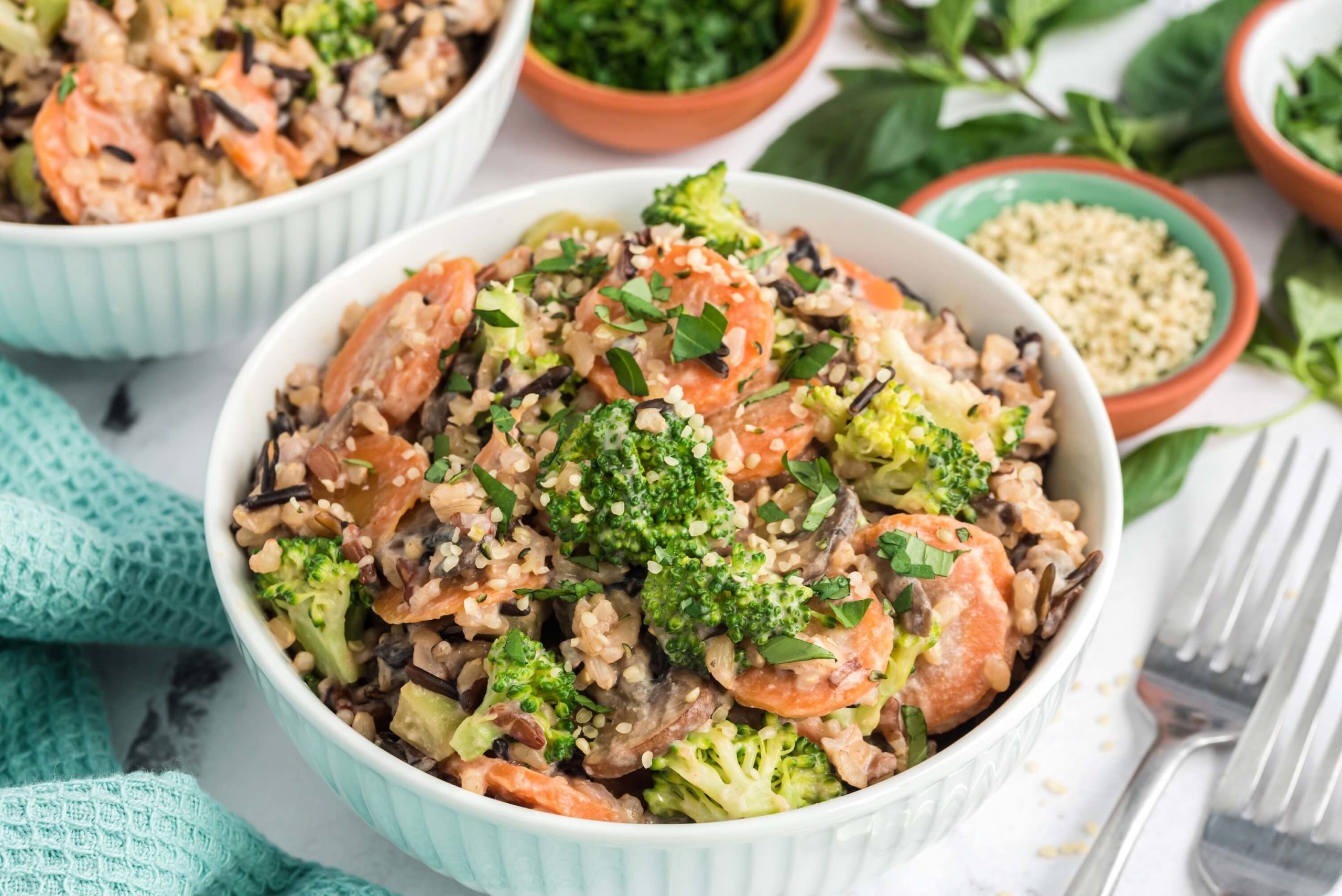
Wild Rice, Mushroom, and Baby Broccoli Salad is more than just a tasty dish — it’s a bowl of nourishment designed to help support your body. Packed with two superstar ingredients — mushrooms and baby broccoli — this salad is perfect for anyone looking to use food to alleviate symptoms of autoimmune conditions. Tossed with a creamy tahini dressing that’s just the right mix of tangy and naturally sweet and topped with crunchy hemp seeds and fresh herbs, every bite is as satisfying as it is healing. Whether you’re focusing on gut health or just craving a wholesome, feel-good meal, this salad has got you covered!
Empower Yourself To Heal Through Food
While autoimmune diseases can be notoriously frustrating to address, the good news is that food can be a powerful tool for fighting illness and helping the body heal.
By sticking to a healthy diet based on whole plant foods and avoiding some key triggers, you can greatly improve your well-being. You can also boost and balance your immune system so that it can be your reliable friend and protector for years and decades to come.
Editor’s Note: If you want to adopt a plant-based diet, check out FRN’s Guide to Going Plant-Based.
If you’d like a coach to help you customize your approach, check out Plantrician Project’s directory of FRN-certified Plant-Based Coaches here.
And if you want to dive deep into nutrition or become a certified plant-based coach, check out FRN’s Plant-Based Coaching Certification here.
Tell us in the comments:
- Have you or anyone you love ever faced an autoimmune disease?
- Have you found anything that helped?
Featured Image: iStock.com/AntonioGuillem



